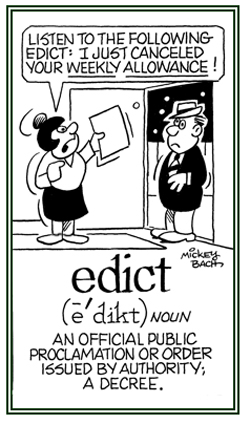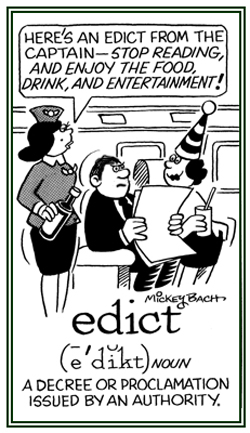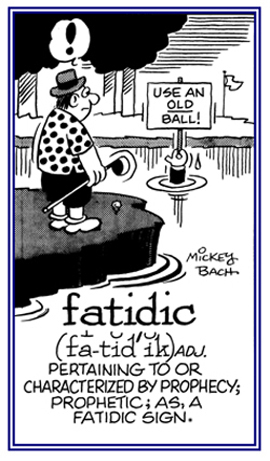dic-, dict-
(Latin: talk, speak, say, tell, declare; to proclaim)
The "Edict of Nantes" was issued by Henry IV of France which granted toleration to Protestants; then this edict was revoked by Louis XIV.
2. An order or decree that is authorized by someone who has the power to enforce laws or to determine what is legal or illegal: The government issued an edict requiring men between the ages of 18 and 30 to join the military in order to defend their country against an evading army.
The mayor, with the support of the city counsel, issued an edict that prohibited people from walking with their dogs without leashes so their pets could be controlled in order to keep them from being run over by cars passing by.


Go to this Word A Day Revisited Index
so you can see more of Mickey Bach's cartoons.
2. Etymology: from Latin fatidicus which came from fatum, "fate" + dicare, "to say, to speak'.

Go to this Word A Day Revisited Index
so you can see more of Mickey Bach's cartoons.
2. Something which is used to point out, to identify information on a page or a projected screen, etc.: "Jason used an index which had a bright light at the end of it to indicate the important information on his power point projection."
3. Etymology: "the forefinger (used for pointing)", from Latin index, indicis. "forefinger, pointer, sign, list, catalogue"; literally, "anything that points out", from indicare, "to point out, to indicate".
The meaning of a "list of the contents of book's" is first recorded in 1580, from Latin phrases; such as, Index Nominum, "Index of Names", index expurgatorius, "specification of passages to be deleted from works otherwise permitted"; and Index Verborum, "Index of Words" which was used as headings in English books of that time.
The Catholic Church sense of "forbidden books" is from index librorum prohibitorum, which was first published in 1564 by the authority of Pius IV.
2. Etymology: from Latin, "list of forbidden books".
2. In medicine, to designate a remedy or method of treatment: The presence of a high fever seemed to indicate to Dr. Jonas that the patient might have appendicitis and would require immediate surgery.
3. A course of action, treatment, etc. which is to be suggested as desirable or necessary: The librarian, by directing attention to the SILENCE PLEASE sign, was indicating that the students were being too loud!
4. To direct attention to the presence or existence of a signal: The sailors believed that a red sky in the evening indicated that the next day would be good for sailing because of the saying: "Red sky at night, sailor's delight; red sky in the morning, sailors take warning".
5. To turn direct attention to by using the hand to signal an action: The outline of a hand on the traffic sign indicated that the bus should turn left to continue the trip to the sea side.
6. To state or express something by some small action without details: Alison's smiling face indicated that she was happy to be going shopping with her mother.
2. A hint, a suggestion, or a piece of information from which more may be inferred: "Madeline's bemused smile was an indication that she was going to tell a funny joke or story."
3. In medicine, a suggestion or direction as to the treatment of a disease, derived from the symptoms observed: "Doctor Silas suggested that the swollen and tender joint in the patient's thumb was an indication of arthritis."
4. The degree of some physical state, as pressure, temperature, etc., shown by an instrument, as a barometer, anemometer, thermometer, etc.; the reading of a graduated instrument: "The minus 30c on the outdoor thermometer was a clear indication that it was freezing outside."
2. Relating to the grammatical mood of a verb that is used in ordinary factual or objective statements: "The sunnier the day, the more indicative of spring was what Sue thought when looking out the window."
2. A mechanical device, or a recording instrument, that presents the condition of an apparatus, etc., to which it is attached: "The indicator on the panel of the car indicated that the gas tank was almost empty."


